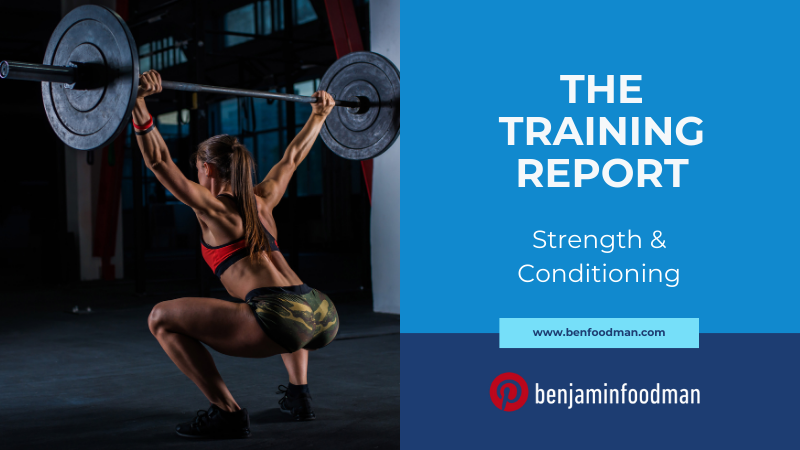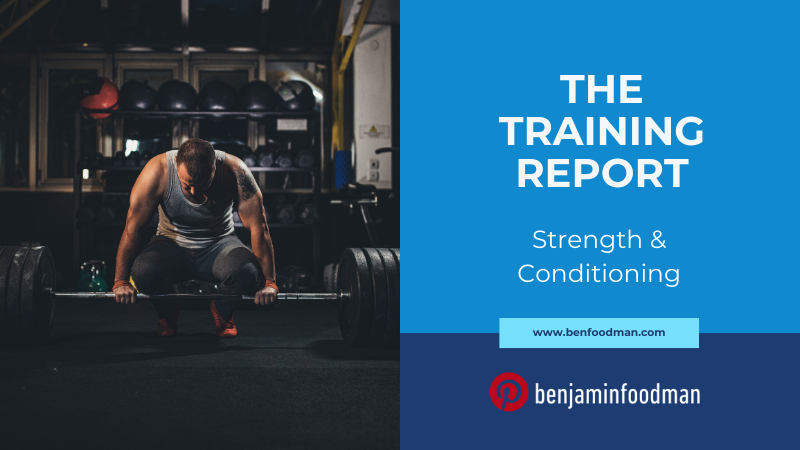Strength & Conditioning - Destroying the One Rep Max Myth
About the Author
Ben Foodman is a licensed psychotherapist & performance specialist. He owns his private practice located in Charlotte North Carolina where he specializes in working with athletes to help them overcome mental blocks (the yips), PTSD, ADD / ADHD and achieve flow states through the techniques of Brainspotting & Neurofeedback. If you are interested in services, use the link here! Enjoy the article below!
Introduction: The Myth Of The 1 Rep Maximum Attempt
There is a new myth going around the strength & conditioning community where people are under the impression that Olympic-style weightlifting movements and one rep max attempts should be avoided due to concerns of ‘potential’ athlete injury. Research indicates that the opposite to hold true, which is that Olympic-style weightlifting is not only one of the safest sports athletes can participate in, it also will help reduce the likelihood of injury.
I want to use this Training Report to discuss how unlikely you are to sustain an injury to yourself during a one rep max attempt, the importance of regularly having your athletes engage in one rep max attempts, and provide advanced periodization tactics you can use to safely cycle up to a one rep max attempt. We will review some of the literature that supports these positions and provide specific strategies you can use from reading this report.
Part I. National Strength & Conditioning Association Research
Research that has been published in the Journal of Strength & Conditioning consistently reports that weightlifting as a sport has some of the lowest injury rates compared to other sports. For instance, research from a 1994 study demonstrated that some of the highest injury rates per 100 participant hours in school sports included the following: Soccer; Rugby; Handball; Track & Field; Gymnastics; Cross-country; & Football. Weightlifting as a sport even finished behind physical education in terms of injury rates. Furthermore, why would an athlete be at higher risk attempting a one rep max then they would attempting four repetitions at 85 or even 90% of a one rep max? Even though there is obviously no reason as to why the athlete would be at greater risk, many sport coaches and even strength coaches still continue to promote this false narrative that one rep max attempts are ‘not worth the risk’.
Olympic weightlifting is defined by one rep max attempts and as research shows, the risk for injury is minimal. If someone is truly concerned about the risk of injury then there are several steps that a coach can take to help the athlete reduce the possibility of injury: First, conduct a thorough history of athlete injury history; conduct a thorough movement analysis screening; implement regular prehab regimens into the athlete’s training; promote consistent warm up and stretching; teach proper technique; be sound in your programming; place a strong emphasis on mental training to enhance parasympathetic nervous system activity; and schedule rest when necessary. All of these interventions should be prescribed regardless of whether the athlete is attempting a one rep max or casually training.
Part II. Sport Specific Movement & Training
I want to emphasize that it is important that athletes train the movements and energy systems that most closely resemble the sport that they are competing in. For instance, it would be far more effective to have a basketball player practice power jerks at an 80% intensity then it would to have them run 3 miles in one sitting. With that being said, having athletes occasionally attempt a one rep max after they have properly periodized will yield important results that coaches should strongly consider when designing their macro, meso and microcycles. First, one rep max attempts require the athletes to hone in on a synchronized mind/body approach.
One rep max attempts are less about brute strength and more about precision. Having the experience of cultivating this mindset is relevant for any and all sporting events. Second, one rep max attempts provide quantifiable data that coaches can use to actually calculate more accurate percentages during certain training blocks. This is important because the athlete will actually know where they are in terms of their actual strength gains rather than having a rough estimate of where they are. Finally, one rep max attempts are a good way to provide excitement into training and will help keep the athletes stay engaged in the long-term process rather than doing the same repetitive training regimens.
Part III. Sample Training Block
The following is a training block sample that you can use in Olympic-style weightlifting to help safely work up to a proper one rep max attempt. Some of the tactics in this program are advanced, yet they are very simple to follow and can be applied to almost all athletes that are engaged in the sport. Essentially, as the intensity of load increases steadily over time, the volume of work will decrease. Many experts seem to agree that a two week taper period will lead to best results when training for one rep max attempts within the sport of Olympic weightlifting. The following program is only a generalized sample. Strength training programs should be constructed to match the individual’s needs.
WEEK 1
Day 1.
Set 1. Snatch 3 x 2 @ 80% Set 2. Clean & Jerk 2 x 2 @ 80% Superset 1. Back Squat + Standing Push Press (3 x 5 @ 80%, 3 x 5 @ 80%)
Superset 2. Single Leg RDL + Half-Kneeling Single Arm Shoulder Press ( 3 x 8 @ BW, 3 x 5 @ 80%)
Day 2.
Set 1. Snatch 3 x 2 @ 80% Set 2. Clean & Jerk 2 x 2 @ 80% Superset 1. Front Squat + Drop Snatches (3 x 5 @ 80%, 3 x 3 @ 80%)
Superset 2. Single Leg RDL + Single Leg Step Down (Both 3 x 8 @ BW)
Day 3.
Set 1. Snatch 3 x 2 @ 85% Set 2. Clean & Jerk 2 x 2 @ 85% Superset 1. Front Squat + Bench Press (3 x 5 @ 85%, 3 x 5 @ 85%)
Superset 2. Single Leg RDL + Single Leg Step Down (Both 3 x 8 @ BW)
WEEK 2
Day 1.
Set 1. Snatch 3 x 2 @ 85% Set 2. Clean & Jerk 2 x 2 @ 85% Superset 1. Back Squat + Standing Push Press (3 x 5 @ 85%, 3 x 5 @ 85%)
Superset 2. Single Leg RDL + Half-Kneeling Single Arm Shoulder Press ( 3 x 8 @ BW, 3 x 5 @ 85%)
Day 2.
Set 1. Snatch 3 x 2 @ 85% Set 2. Clean & Jerk 2 x 2 @ 85% Superset 1. Front Squat + Drop Snatches (3 x 5 @ 85%, 3 x 3 @ 85%)
Superset 2. Single Leg RDL + Single Leg Step Down (Both 3 x 8 @ BW)
Day 3.
Set 1. Snatch 2 x 2 @ 90% Set 2. Clean & Jerk 2 x 2 @ 90% Superset 1. Front Squat + Bench Press (3 x 3 @ 90%, 3 x 3 @ 90%)
Superset 2. Single Leg RDL + Single Leg Step Down (Both 3 x 8 @ BW)
WEEK 3
Day 1.
Set 1. Snatch 2 x 1 @ 90% Set 2. Clean & Jerk 2 x 1 @ 90% Set 3. Back Squat 3 x 1 @ 95%
Day 2.
Set 1. Snatch 2 x 1 @ 95% Set 2. Clean & Jerk 2 x 1 @ 95% Set 3. Back Squat Attempt New 1 Rep Max
Day 3.
Set 1. Snatch 2 x 1 @ 90% Set 2. Clean & Jerk 1 x 1 @ Opener
WEEK 4
Day 1.
Set 1. Snatch 1 x 1 @ Opener Set 2. Clean & Jerk 3 x 1 @ 70%
Day 2.
Set 1. Snatch 2 x 1 @ 65-75% Set 2. Clean & Jerk 2 x 1 @ 65-75%
Day 3.
Set 1. Snatch 2 x 1 @ 65-75% Set 2. Clean & Jerk 2 x 1 @ 65-75%
COMPETITION / ONE REP MAX WEEK! ATTEMPT ONE REP MAX ON SNATCH AND CLEAN & JERK!
Note To Reader:
If you are an athlete reading this segment of the TRAINING REPORT, hopefully this content was helpful! I put the Training Report together because I felt like many of the discussions on issues such as the Yips/mental blocks, strength training & other subject matter on athlete performance concepts were really missing the mark on these ideas (e.g. how trauma is the direct cause of the Yips). If you are interested in learning more, make sure to subscribe below for when I put out new content on issues related to sport psychology & athlete performance! Also, if you are looking to work with a mental performance specialist, you are in the right place! USE THIS LINK to reach out to me to see if my services are the right fit for your goals!
ARE YOU ON THE LIST?
Make sure you’re signed up to Ben’s mailing list to receive news & updates on new strategies in sport psychology, upcoming workshops & products. Don’t wait, sign up now!


























